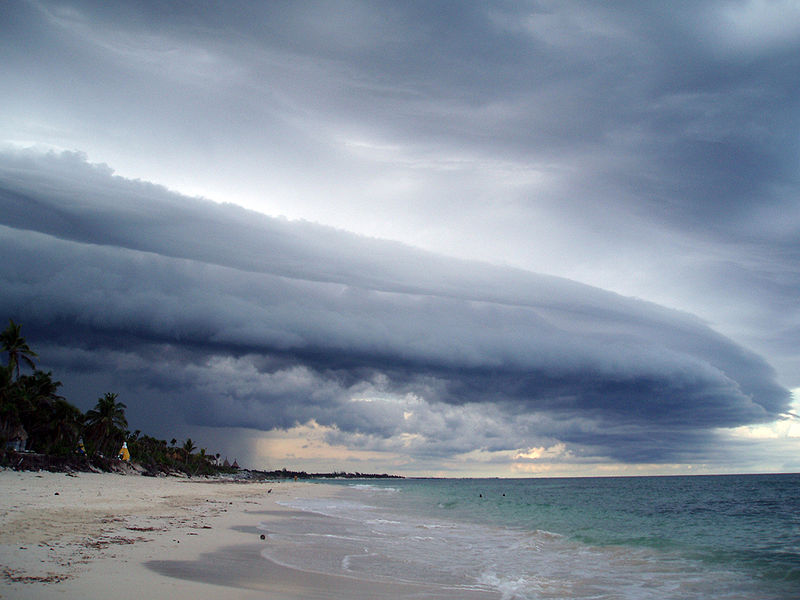.
Often, to pass the idle hours of the voyage,
Sailors will capture that great slow follower
Of their gliding passage over the bitter depths,
Proudest of sea birds, the albatross.
King of the azure the sailors call it, with a wink --
For once the great ungainly wings are stretched
Out and trailing across the briny planks
Like abandoned oars, this vast being's suddenly
Helpless, maladroit and embarrassed,
Vaguely ridiculous. A sailor pokes its beak with a pipe,
Another acts out the fallen bird's distress,
Dragging a theatrical game leg across the deck.
The poet is very much like this Prince of the Clouds,
Floating above stormy waters, mocking the distant marksman;
But once brought down, a laughable figure, stranded,
Broken wings swim-flipper-slapping the wormy wood.

Laysan Albatross (Phoebastria immutabilis) flying at Old Fuel Farm Sand island, Midway Atoll: photo by Forest and Kim Starr, 2008
Roll cloud over east coast of Yucatan (Mexico): photo by Sensenmann, 2005
Roll cloud over east coast of Yucatan (Mexico): photo by Sensenmann, 2005
L'Albatros: Charles Baudelaire (drafted 1842; final quatrain added for publication, 1859): translated by TC

Your "Albatross" may hang around my neck for some time, Tom--largely because of "swim-flipper-slapping the wormy wood." A bold individual touch, like something Lowell would do in an "imitation."
ReplyDeleteWhen the sailor prods the poor albatross with his "brule-guele," I tend to think of Rimbaud's "coeur vole" covered with the soldiers' "caporal" (also of the slangy sense of "une pipe"), and I tend to wonder if Rimbaud had "L'albatros" in mind when he wrote his shocking triolet. No doubt you know.
David,
ReplyDeleteYou know it was you who reminded me of this poem, some months ago, so in that sense this post is owed to you.
And yes, that line also made me feel I was channeling "Imitations". It did make me understand that while there are risks in going out on a limb, and over-reaching, when a poem is this well known and this frequently attacked by translators, it's probably not a bad idea to take a chance or two and try something new, even if in the end it's risible, a phrase like that one, doing the tuna on the deck...
Still I'll also admit that for me it's what made the poem.
So thank you again for the inspiration and the (let's hope only slightly flattering) insight.
Brilliant, Tom..
ReplyDeletewhoa..
:)
I know what it takes to translate poetry. A whole new poem comes out as a result. Now, I can't read French but the way you have put words together in my beloved English language when translating this poem has touched me deeply. And on top of all that, the image of the albatross unavoidably brings the "ECHOES" of that music I cherish played by the fingers of no less talented men. Thanks, Tom, for so much beauty.
ReplyDeleteLucy,
ReplyDeleteBaudelaire may or may not actually have seen an albatross from on board a ship headed from Bordeaux to India in 1841. It is known for sure only that he made it as far as Mauritius, but the maritime imagery evidently accumulated on the voyage seems to have got into quite a few of his poems, including this one.
Pink Floyd's bird appears, not too surprisingly, to be a bit more spacey:
overhead the albatross
hangs motionless upon the air
and deep beneath the rolling waves
in labyrinths of coral caves
an echo of a distant time
comes willowing across the sand
and everything is green and submarine...
Lanny,
And let's never let those sailors catch us!
You see? As I said before, I love everything you quote =)
ReplyDeleteGreat to read this again, Tom, in your revivifying translation. Fantastic, in fact.
ReplyDeleteMany thanks, Stu, the poem is for me one of those "recurring memories" stitched into the history of the mind... or perhaps I should say a persistent avian follower of my po-boat, though there may not be much left but the bubbles.
ReplyDeleteyes the poets are fine and fragile
ReplyDeleteglass that break easily when
dropped or thrown....on the other hand
civilization, though frequently not
during the poet's life time, has always known that wine seems to taste better in fine and fragile
glass....it is important to note
that Yeats said "we have no gift"
as far as politicans go....presumably money....also
theater was banned for some significant period in England
relatively shortly after Shakespeare died...and after all
he was the greatest of the albatross and at the end did he
hoard wheat? Maybe TC can clear
some of this up
yes the poets are fine and fragile
ReplyDeleteglass that break easily when
dropped or thrown....on the other hand
civilization, though frequently not
during the poet's life time, has always known that wine seems to taste better in fine and fragile
glass....it is important to note
that Yeats said "we have no gift"
as far as politicans go....presumably money....also
theater was banned for some significant period in England
relatively shortly after Shakespeare died...and after all
he was the greatest of the albatross and at the end did he
hoard wheat? Maybe TC can clear
some of this up
The Poet Thinks It Over
ReplyDeleteThe Poet Continues to Think It Over
ReplyDeletePeculiar to say the least.
ReplyDeleteI wonder if Baudelaire would have even recognized it.
Then again, I wonder if he'd have liked my own attempt:
http://poemsintranslation.blogspot.com/2009/06/charles-baudelaire-albatross-from.html